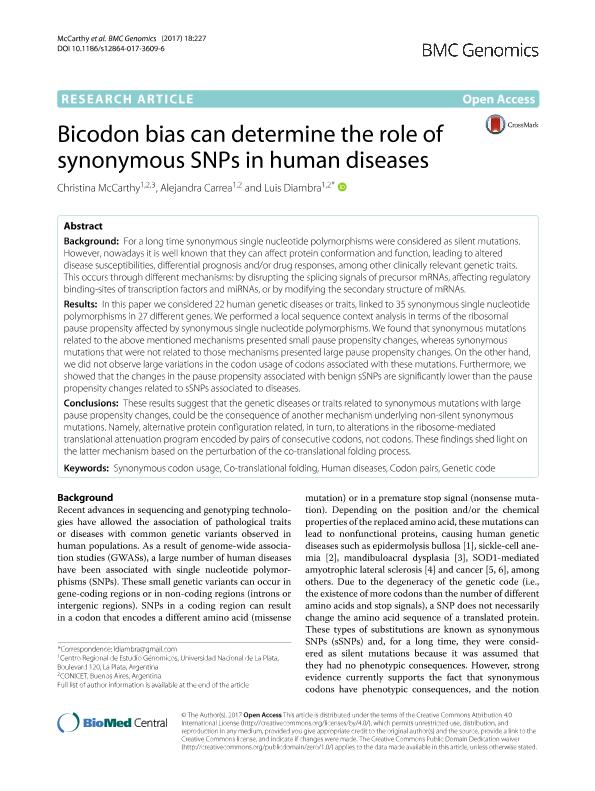Mostrar el registro sencillo del ítem
dc.contributor.author
Mccarthy, Cristina Beryl

dc.contributor.author
Carrea, Alejandra

dc.contributor.author
Diambra, Luis Anibal

dc.date.available
2018-08-21T19:30:13Z
dc.date.issued
2017-03
dc.identifier.citation
Mccarthy, Cristina Beryl; Carrea, Alejandra; Diambra, Luis Anibal; Bicodon bias can determine the role of synonymous SNPs in human diseases; BioMed Central; BMC Genomics; 18; 1; 3-2017
dc.identifier.issn
1471-2164
dc.identifier.uri
http://hdl.handle.net/11336/56420
dc.description.abstract
Background: For a long time synonymous single nucleotide polymorphisms were considered as silent mutations. However, nowadays it is well known that they can affect protein conformation and function, leading to altered disease susceptibilities, differential prognosis and/or drug responses, among other clinically relevant genetic traits. This occurs through different mechanisms: by disrupting the splicing signals of precursor mRNAs, affecting regulatory binding-sites of transcription factors and miRNAs, or by modifying the secondary structure of mRNAs. Results: In this paper we considered 22 human genetic diseases or traits, linked to 35 synonymous single nucleotide polymorphisms in 27 different genes. We performed a local sequence context analysis in terms of the ribosomal pause propensity affected by synonymous single nucleotide polymorphisms. We found that synonymous mutations related to the above mentioned mechanisms presented small pause propensity changes, whereas synonymous mutations that were not related to those mechanisms presented large pause propensity changes. On the other hand, we did not observe large variations in the codon usage of codons associated with these mutations. Furthermore, we showed that the changes in the pause propensity associated with benign sSNPs are significantly lower than the pause propensity changes related to sSNPs associated to diseases. Conclusions: These results suggest that the genetic diseases or traits related to synonymous mutations with large pause propensity changes, could be the consequence of another mechanism underlying non-silent synonymous mutations. Namely, alternative protein configuration related, in turn, to alterations in the ribosome-mediated translational attenuation program encoded by pairs of consecutive codons, not codons. These findings shed light on the latter mechanism based on the perturbation of the co-translational folding process.
dc.format
application/pdf
dc.language.iso
eng
dc.publisher
BioMed Central

dc.rights
info:eu-repo/semantics/openAccess
dc.rights.uri
https://creativecommons.org/licenses/by-nc-sa/2.5/ar/
dc.subject
Co-Translational Folding
dc.subject
Codon Pairs
dc.subject
Genetic Code
dc.subject
Human Diseases
dc.subject
Synonymous Codon Usage
dc.subject.classification
Genética Humana

dc.subject.classification
Medicina Básica

dc.subject.classification
CIENCIAS MÉDICAS Y DE LA SALUD

dc.title
Bicodon bias can determine the role of synonymous SNPs in human diseases
dc.type
info:eu-repo/semantics/article
dc.type
info:ar-repo/semantics/artículo
dc.type
info:eu-repo/semantics/publishedVersion
dc.date.updated
2018-08-21T18:38:05Z
dc.journal.volume
18
dc.journal.number
1
dc.journal.pais
Reino Unido

dc.journal.ciudad
Londres
dc.description.fil
Fil: Mccarthy, Cristina Beryl. Universidad Nacional de La Plata. Centro Regional de Estudios Genómicos; Argentina. Consejo Nacional de Investigaciones Científicas y Técnicas; Argentina
dc.description.fil
Fil: Carrea, Alejandra. Universidad Nacional de La Plata. Centro Regional de Estudios Genómicos; Argentina. Consejo Nacional de Investigaciones Científicas y Técnicas; Argentina
dc.description.fil
Fil: Diambra, Luis Anibal. Universidad Nacional de La Plata. Centro Regional de Estudios Genómicos; Argentina. Consejo Nacional de Investigaciones Científicas y Técnicas; Argentina
dc.journal.title
BMC Genomics

dc.relation.alternativeid
info:eu-repo/semantics/altIdentifier/doi/http://dx.doi.org/10.1186/s12864-017-3609-6
dc.relation.alternativeid
info:eu-repo/semantics/altIdentifier/url/https://bmcgenomics.biomedcentral.com/articles/10.1186/s12864-017-3609-6
Archivos asociados
